We wouldn’t dream of abandoning our vast semi–annual Most Anticipated Book Previews, but we thought a monthly reminder would be helpful (and give us a chance to note titles we missed the first time around). Here’s what we’re looking out for this month. Let us know what you’re looking forward to in the comments!
Want to know about the books you might have missed? Then go read our most recent book preview. Want to help The Millions keep churning out great books coverage? Then sign up to be a member today.
November
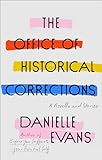 The Office of Historical Corrections by Danielle Evans: Following the success of her 2010 story collection, Before You Suffocate Your Own Fool Self, Evans returns with this funny collection whose stories play on the absurdities of race in America. In one story, a white college student is forced to reinvent her entire identity after an embarrassing photo of her sporting a Confederate flag-themed bikini makes the rounds. In the title story, a D.C.-based professor discovers a conspiracy of Pynchonesque proportions, one that threatens to derail her entire life and to destabilize her understanding of history. These are absurd stories for absurd times. (Ismail)
The Office of Historical Corrections by Danielle Evans: Following the success of her 2010 story collection, Before You Suffocate Your Own Fool Self, Evans returns with this funny collection whose stories play on the absurdities of race in America. In one story, a white college student is forced to reinvent her entire identity after an embarrassing photo of her sporting a Confederate flag-themed bikini makes the rounds. In the title story, a D.C.-based professor discovers a conspiracy of Pynchonesque proportions, one that threatens to derail her entire life and to destabilize her understanding of history. These are absurd stories for absurd times. (Ismail)
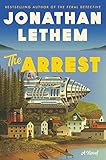 The Arrest by Jonathan Lethem: Something’s happened between apocalypse and inconvenience, and that something is The Arrest. Put simply, business as usual has stopped working. Guns don’t fire, computers don’t work, and cars don’t drive. For everyone, this poses problems. For Sandy Duplessis, a Hollywood screenwriter, it necessitated change, so he’s moved to rural Maine to try to make a new life for himself with his sister—that is, until the day his former associate shows up with a nuclear-powered supercar capable of smashing its way across the continental U.S. Hijinks ensue. (Nick M.)
The Arrest by Jonathan Lethem: Something’s happened between apocalypse and inconvenience, and that something is The Arrest. Put simply, business as usual has stopped working. Guns don’t fire, computers don’t work, and cars don’t drive. For everyone, this poses problems. For Sandy Duplessis, a Hollywood screenwriter, it necessitated change, so he’s moved to rural Maine to try to make a new life for himself with his sister—that is, until the day his former associate shows up with a nuclear-powered supercar capable of smashing its way across the continental U.S. Hijinks ensue. (Nick M.)
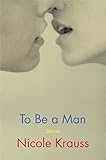 To Be a Man by Nicole Krauss: How many men can a woman’s life hold? By weaving stories about aging parents, generations gaps, newborn babies, and coming of age, Krauss’s new collection looks the lives of women at the point where the forces of sex, power and violence come together—in a couple. Krauss is a National Book Award finalist and New York Times–bestselling author of The History of Love and Great House, among others. The stories in this book mirror each other and provide a balance that makes the collection, as the publisher says, “feels like a novel.” (Claire)
To Be a Man by Nicole Krauss: How many men can a woman’s life hold? By weaving stories about aging parents, generations gaps, newborn babies, and coming of age, Krauss’s new collection looks the lives of women at the point where the forces of sex, power and violence come together—in a couple. Krauss is a National Book Award finalist and New York Times–bestselling author of The History of Love and Great House, among others. The stories in this book mirror each other and provide a balance that makes the collection, as the publisher says, “feels like a novel.” (Claire)
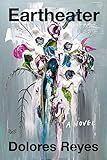 Eartheater by Dolores Reyes (translated by Julia Sanches): This debut from an Argentinian teacher and activist tells the story of a young girl with a strange desire to eat dirt. Her compulsion leads to a powerful clairvoyant gift: eating earth allows her to find the bodies of people who have gone missing, and to know the circumstances of their murders. Her first taste of dirt teaches her the truth about her mother’s death. She tries to keep her visions secret but when people hear of her gift, they beg for help in finding their own loved ones. (Hannah)
Eartheater by Dolores Reyes (translated by Julia Sanches): This debut from an Argentinian teacher and activist tells the story of a young girl with a strange desire to eat dirt. Her compulsion leads to a powerful clairvoyant gift: eating earth allows her to find the bodies of people who have gone missing, and to know the circumstances of their murders. Her first taste of dirt teaches her the truth about her mother’s death. She tries to keep her visions secret but when people hear of her gift, they beg for help in finding their own loved ones. (Hannah)
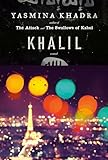 Khalil by Yasmina Khadra (translated by John Cullen): In this first-person thriller by Khadra, the pseudonym of former Algerian army officer Mohammed Moulessehoul, Khalil, a young Belgian man of Moroccan descent, tries to detonate a suicide vest outside the Stade de France in Paris—and fails. Fraternel Solidarity, an ISIS affiliate, has other plans for Khalil. He returns to Belgium, but must hide the truth both from the authorities and his own family, anticipating all the time his next mission. What follows is the story of a man struggling with questions of religion, politics, and family. (Jacqueline)
Khalil by Yasmina Khadra (translated by John Cullen): In this first-person thriller by Khadra, the pseudonym of former Algerian army officer Mohammed Moulessehoul, Khalil, a young Belgian man of Moroccan descent, tries to detonate a suicide vest outside the Stade de France in Paris—and fails. Fraternel Solidarity, an ISIS affiliate, has other plans for Khalil. He returns to Belgium, but must hide the truth both from the authorities and his own family, anticipating all the time his next mission. What follows is the story of a man struggling with questions of religion, politics, and family. (Jacqueline)
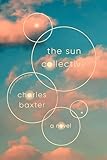 The Sun Collective by Charles Baxter: It’s been a while since we’ve seen a novel from Baxter—though the past decade has brought two short story collections; he’s one of those writers who can do both, superbly. Now, in his sixth novel, he tells the story of intersecting lives in Minneapolis: a missing actor, the actor’s desperate mother, a young woman addicted to a drug that gives a feeling of “blessedness,” and a quasi-religious community group, The Sun Collective. (Hannah)
The Sun Collective by Charles Baxter: It’s been a while since we’ve seen a novel from Baxter—though the past decade has brought two short story collections; he’s one of those writers who can do both, superbly. Now, in his sixth novel, he tells the story of intersecting lives in Minneapolis: a missing actor, the actor’s desperate mother, a young woman addicted to a drug that gives a feeling of “blessedness,” and a quasi-religious community group, The Sun Collective. (Hannah)
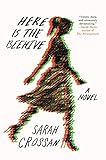 Here Is the Beehive by Sarah Crossan: Crossan’s first novel for adult readers opens on a now three-year-old heady affair between two people, Ana and Connor. When Connor dies, Ana finds herself trapped in a grief she cannot share, for someone whose connection to her is unknown to anyone else in the world. Rather than vilifying Connor’s wife, Rebecca, the “shadowy figure who has always stood just beyond her reach,” Ana seeks her out. A gripping exploration of obsession, risk, and loss. (Jacqueline)
Here Is the Beehive by Sarah Crossan: Crossan’s first novel for adult readers opens on a now three-year-old heady affair between two people, Ana and Connor. When Connor dies, Ana finds herself trapped in a grief she cannot share, for someone whose connection to her is unknown to anyone else in the world. Rather than vilifying Connor’s wife, Rebecca, the “shadowy figure who has always stood just beyond her reach,” Ana seeks her out. A gripping exploration of obsession, risk, and loss. (Jacqueline)
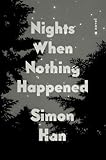 Nights When Nothing Happened by Simon Han: Han’s literary debut introduces us to the Cheng family of Dallas, living successful personal and professional lives while helping to support extended relatives in China. Nights When Nothing Happened received high praise from Lorrie Moore, who called it a “tender, spiky family saga about love in all its mysterious incarnations.” Han’s novel explores what belonging means, both in terms of a family and a nation, as Nights When Nothing Happened brings texture, nuance, and subtlety to the reductionist condescension of the “model minority” trope. (Ed)
Nights When Nothing Happened by Simon Han: Han’s literary debut introduces us to the Cheng family of Dallas, living successful personal and professional lives while helping to support extended relatives in China. Nights When Nothing Happened received high praise from Lorrie Moore, who called it a “tender, spiky family saga about love in all its mysterious incarnations.” Han’s novel explores what belonging means, both in terms of a family and a nation, as Nights When Nothing Happened brings texture, nuance, and subtlety to the reductionist condescension of the “model minority” trope. (Ed)
 The Thirty Names of Night by Zeyn Joukhadar: By the author of The Map of Salt and Stars, a novel about three generations of Syrians linked by a particular species of bird. R.O. Kwon says of the book, “Zeyn Joukhadar’s new book is a vivid exploration of loss, art, queer and trans communities, and the persistence of history. Often tender, always engrossing, The Thirty Names of Night is a feat.” (Lydia)
The Thirty Names of Night by Zeyn Joukhadar: By the author of The Map of Salt and Stars, a novel about three generations of Syrians linked by a particular species of bird. R.O. Kwon says of the book, “Zeyn Joukhadar’s new book is a vivid exploration of loss, art, queer and trans communities, and the persistence of history. Often tender, always engrossing, The Thirty Names of Night is a feat.” (Lydia)
 Bring Me the Head of Quentin Tarantino by Julián Herbert (translated by Christina MacSweeney): Who could resist a story collection with a title like this? In the deliriously pulpy title story, a Mexican drug lord who could pass for Quentin Tarantino’s twin kidnaps a film critic so he can discuss Tarantino’s films while he sends a squad of goons to kill the doppelgänger who has colonized his consciousness. The collection’s other stories, ranging from antic to dire, dissect the violence and corruption that plague Mexico today. The raffish cast includes a cokehead, a ghost, a personal memories coach, and a man who discovers music in his teeth. Collectively, they ask the question: How much violence can a person, and a country, take? (Bill)
Bring Me the Head of Quentin Tarantino by Julián Herbert (translated by Christina MacSweeney): Who could resist a story collection with a title like this? In the deliriously pulpy title story, a Mexican drug lord who could pass for Quentin Tarantino’s twin kidnaps a film critic so he can discuss Tarantino’s films while he sends a squad of goons to kill the doppelgänger who has colonized his consciousness. The collection’s other stories, ranging from antic to dire, dissect the violence and corruption that plague Mexico today. The raffish cast includes a cokehead, a ghost, a personal memories coach, and a man who discovers music in his teeth. Collectively, they ask the question: How much violence can a person, and a country, take? (Bill)
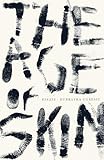 The Age of Skin by Dubravka Ugrešić (translated by Ellen Elias-Bursac): A new book from Ugrešić, one of Europe’s foremost critics and most influential writers, is always worthy of celebration. Exiled from her native Croatia after the fall of Yugoslavia, Ugrešić brings a wisdom and vision and dark humor that’s particularly pertinent in our turbulent times. In The Age of Skin she touches on vast and varied cultural references, “from La La Land and Dawn of the Planet of the Apes, to tattoos and body modification, World Cup chants, and the preservation of Lenin’s corpse—takes on the dreams, hopes, and fears of modern life.” (Anne)
The Age of Skin by Dubravka Ugrešić (translated by Ellen Elias-Bursac): A new book from Ugrešić, one of Europe’s foremost critics and most influential writers, is always worthy of celebration. Exiled from her native Croatia after the fall of Yugoslavia, Ugrešić brings a wisdom and vision and dark humor that’s particularly pertinent in our turbulent times. In The Age of Skin she touches on vast and varied cultural references, “from La La Land and Dawn of the Planet of the Apes, to tattoos and body modification, World Cup chants, and the preservation of Lenin’s corpse—takes on the dreams, hopes, and fears of modern life.” (Anne)
 Lord the One You Love Is Sick by Kasey Thornton: This debut novel in the form of linked stories is an unflinching look at the dark truths that dwell just beneath the sunny surface of small southern towns. The fictional Bethany, set somewhere in the author’s native North Carolina, is “like a nice Persian rug that had been stapled into place over a damp floor for a hundred years. Peel up a corner and see what you find.” What we find in the collection’s opening story is a young man dying from a drug overdose, which has rippling fallout for his mother, his gay agoraphobic brother, his best friend, his best friend’s wife—in the end, just about everybody in Bethany. The writing is assured, understated, yet propulsive. Kasey Thornton is a writer to watch. (Bill)
Lord the One You Love Is Sick by Kasey Thornton: This debut novel in the form of linked stories is an unflinching look at the dark truths that dwell just beneath the sunny surface of small southern towns. The fictional Bethany, set somewhere in the author’s native North Carolina, is “like a nice Persian rug that had been stapled into place over a damp floor for a hundred years. Peel up a corner and see what you find.” What we find in the collection’s opening story is a young man dying from a drug overdose, which has rippling fallout for his mother, his gay agoraphobic brother, his best friend, his best friend’s wife—in the end, just about everybody in Bethany. The writing is assured, understated, yet propulsive. Kasey Thornton is a writer to watch. (Bill)
 How to Slowly Kill Yourself and Others in America by Kiese Laymon: First published in 2013, the expanded reissue of Laymon’s first nonfiction collection features six new essays that explore the intersection of the interior—family, history, memory—and the exterior—white supremacy, bigotry, violence. The book explores race, identity, and familial bonds. Kirkus calls the collection, “A timely and disquieting contribution to urgent conversations about race.” (Carolyn)
How to Slowly Kill Yourself and Others in America by Kiese Laymon: First published in 2013, the expanded reissue of Laymon’s first nonfiction collection features six new essays that explore the intersection of the interior—family, history, memory—and the exterior—white supremacy, bigotry, violence. The book explores race, identity, and familial bonds. Kirkus calls the collection, “A timely and disquieting contribution to urgent conversations about race.” (Carolyn)
 One Night Two Souls Went Walking by Ellen Cooney: In Cooney’s 10th novel, which Alyson Hagy called “radiant, humane, splendidly joyous,” an unnamed, 30-something hospital chaplain spends one night performing rounds: comforting patients, offering them grace, and finding connection and healing in the face of great suffering. Now, more than ever, we need to be reminded that hope prevails—and this novel does exactly that. (Carolyn)
One Night Two Souls Went Walking by Ellen Cooney: In Cooney’s 10th novel, which Alyson Hagy called “radiant, humane, splendidly joyous,” an unnamed, 30-something hospital chaplain spends one night performing rounds: comforting patients, offering them grace, and finding connection and healing in the face of great suffering. Now, more than ever, we need to be reminded that hope prevails—and this novel does exactly that. (Carolyn)
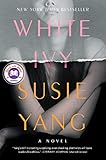 White Ivy by Susie Yang: Longlisted for the Center for Fiction’s First Novel Prize, Yang’s debut is a coming-of-age tale about privilege, class, and identity. Ivy, a Chinese-American teenager, is raised by her immigrant grandmother to emulate the traditional suburban life by any means necessary. When she meets Gideon Speyer, the prized son of a powerful political family, her life is upended. Years later, the two are reunited and Ivy will stop at nothing to have the life she’s always dreamed of. About the novel, Neel Patel says, “Bold, daring, and sexy, White Ivy is the immigrant story we’ve been dying to hear.” (Carolyn)
White Ivy by Susie Yang: Longlisted for the Center for Fiction’s First Novel Prize, Yang’s debut is a coming-of-age tale about privilege, class, and identity. Ivy, a Chinese-American teenager, is raised by her immigrant grandmother to emulate the traditional suburban life by any means necessary. When she meets Gideon Speyer, the prized son of a powerful political family, her life is upended. Years later, the two are reunited and Ivy will stop at nothing to have the life she’s always dreamed of. About the novel, Neel Patel says, “Bold, daring, and sexy, White Ivy is the immigrant story we’ve been dying to hear.” (Carolyn)
 Somewhere in the Unknown World by Kao Kalia Yang: With nativism and xenophobia on the rise, Yang—an award-winning author and Hmong refugee—gathers the powerful and deeply human stories of 14 refugees living in Minnesota. “In a time when the term ‘refugee’ is so often flat and faceless, this is an essential book of poetic beauty and social witness,” says author Sarah Smarsh. (Carolyn)
Somewhere in the Unknown World by Kao Kalia Yang: With nativism and xenophobia on the rise, Yang—an award-winning author and Hmong refugee—gathers the powerful and deeply human stories of 14 refugees living in Minnesota. “In a time when the term ‘refugee’ is so often flat and faceless, this is an essential book of poetic beauty and social witness,” says author Sarah Smarsh. (Carolyn)
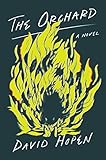 The Orchard by David Hopen: With comparisons to The Secret History and Old School, Hopen’s debut follows Ari Eden when he’s uprooted from his ultra-Orthodox neighborhood and dropped into the secular Miami suburbs. When he becomes enmeshed with a group of charismatic classmates, he and the others begin testing their faith in increasingly dangerous ways. About the novel, Nathan Hill says: “It’s a story of profound intelligence, a story of tragic grandeur, and a story unlike any other I’ve ever read.” (Carolyn)
The Orchard by David Hopen: With comparisons to The Secret History and Old School, Hopen’s debut follows Ari Eden when he’s uprooted from his ultra-Orthodox neighborhood and dropped into the secular Miami suburbs. When he becomes enmeshed with a group of charismatic classmates, he and the others begin testing their faith in increasingly dangerous ways. About the novel, Nathan Hill says: “It’s a story of profound intelligence, a story of tragic grandeur, and a story unlike any other I’ve ever read.” (Carolyn)
 The Harpy by Megan Hunter: When Lucy, a wife and mother, learns of her husband Jake’s infidelity, her world is thrown completely off-kilter. Rather than separate, Lucy and Jake decide to make things work—with one caveat: Lucy gets to hurt him three times. From there, they (and their relationship) becomes unrecognizable. Author Jessica Andrews says Hunter “confronts the fear of female anger and asks us what happens when pain that has been swallowed through generations begins to rush to the surface.” (Carolyn)
The Harpy by Megan Hunter: When Lucy, a wife and mother, learns of her husband Jake’s infidelity, her world is thrown completely off-kilter. Rather than separate, Lucy and Jake decide to make things work—with one caveat: Lucy gets to hurt him three times. From there, they (and their relationship) becomes unrecognizable. Author Jessica Andrews says Hunter “confronts the fear of female anger and asks us what happens when pain that has been swallowed through generations begins to rush to the surface.” (Carolyn)
 The Best of Brevity, edited by Zoe Bossiere and Dinty W. Moore: I discovered Brevity when my creative nonfiction professor assigned Anna Vodicka’s “Girl/Thing” for class. By the end of the very brief essay (featured in this anthology), I had fallen in love with not only the literary magazine, but flash nonfiction as a genre. This collection, which includes 84 essays from the website’s 20-plus years, features writers like Roxane Gay, Jaquira Díaz, and Kristen Radtke. There’s beauty in brevity, and this anthology proves it. (Carolyn)
The Best of Brevity, edited by Zoe Bossiere and Dinty W. Moore: I discovered Brevity when my creative nonfiction professor assigned Anna Vodicka’s “Girl/Thing” for class. By the end of the very brief essay (featured in this anthology), I had fallen in love with not only the literary magazine, but flash nonfiction as a genre. This collection, which includes 84 essays from the website’s 20-plus years, features writers like Roxane Gay, Jaquira Díaz, and Kristen Radtke. There’s beauty in brevity, and this anthology proves it. (Carolyn)
 Before the Coffee Gets Cold by Toshikazu Kawaguchi (translated by Geoffrey Trousselot): Already an international-bestseller, Kawaguchi’s English-language debut is set in a small Tokyo coffee shop where time travel is possible—but for only as long as a cup of coffee can stay warm. In interconnected stories, four customers go back in time: to apologize, reminisce, and heal. “Kawaguchi’s tender look at the beauty of passing things, adapted from one of his plays, makes for an affecting, deeply immersive journey into the desire to hold onto the past,” says Publishers Weekly. (Carolyn)
Before the Coffee Gets Cold by Toshikazu Kawaguchi (translated by Geoffrey Trousselot): Already an international-bestseller, Kawaguchi’s English-language debut is set in a small Tokyo coffee shop where time travel is possible—but for only as long as a cup of coffee can stay warm. In interconnected stories, four customers go back in time: to apologize, reminisce, and heal. “Kawaguchi’s tender look at the beauty of passing things, adapted from one of his plays, makes for an affecting, deeply immersive journey into the desire to hold onto the past,” says Publishers Weekly. (Carolyn)










